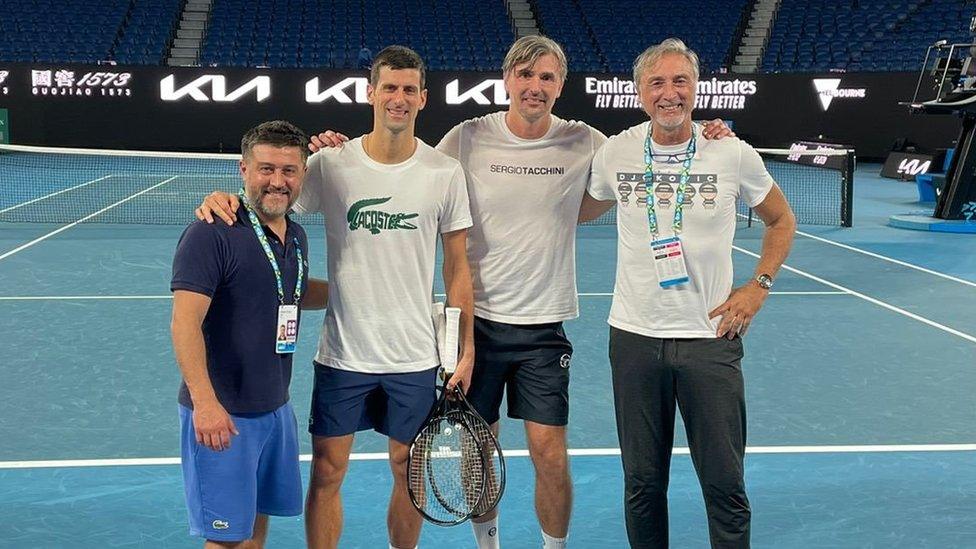Novak Djokovic: Tennis star wins appeal and is back training
- Published
- comments

Novak Djokovic (second from left) and his training and coaching team were back on court in Melbourne on Monday
Tennis world number one, Novak Djokovic, has won his appeal against a decision to refuse him a visa to enter Australia.
A judge in Melbourne ruled that he must be released immediately from immigration detention at a hotel.
Just hours later, Djokovic was seen practicing with his coaching team on a court in Melbourne and said he was "pleased and grateful" to be released.
The judge in charge of his case, Anthony Kelly, said that the process by which his visa was cancelled was unfair.
It all comes after public anger over the decision to give Djokovic special permission - a vaccine exemption - to play in the Australian Open, which begins on 17 January.
What did his family say?
Novak Djokovic's parents and brother spoke to news crews in a press conference in Serbia on Monday.
Novak Djokovic won the 2021 Australian Open
His mother, Dijana Djokovic, said the latest decision from the judge was the "biggest victory" of her son's career.
Papers from court show that he confirmed he was not vaccinated and he said he had tested positive for Covid twice - in June 2020 and on 16 December 2021.
However, Djokovic's family chose not to answer questions they were asked about him attending indoor public gatherings in the days that followed his positive test result in December.
Why was he held?
The Serbian player was held when he arrived in Australia
Australia is seeing tens of thousands of Covid-19 cases for the first time and the rules for people coming into the country are strict, particularly around whether or not you are vaccinated.
The Serbian player has not publicly declared his vaccination status, but last year he said he was "opposed to vaccination".
However, Tennis Australia, who run the Australian Open tournament, had allowed him a medical exemption to come to the tournament, which was granted by two independent medical panels and by the state government where the tournament is played.
That caused a lot of anger in Australia where the public has lived with some of the world's strictest restrictions over the last two years and although more than 90% of over-16s in Australia are fully vaccinated, some people aren't allowed to travel between states or globally because of current rules.
At his arrival, national officials - who control the country's borders - said Djokovic had "failed to provide appropriate evidence" for entry into Australia after arriving on Wednesday, and he was put into a hotel for people who try to come into Australia without proper documentation.
Djokovic appealed against that decision - an appeal he has now won.
Judge Kelly said that the government's decision to cancel Djokovic's visa was "unreasonable" and said he had not been given enough time to speak with tournament organisers or lawyers after his detention.
So is it all over?
Fans celebrated after the Australian court found in his favour
No, not yet.
The Australian Immigration Minister (the person in government who is in charge of who can come in and out of the country) has the authority to make a personal decision on whether or not to allow someone into Australia or to remove them.
In court, the government's lawyers said that option was being considered.
If that decision to force him to leave is taken - and he doesn't successfully appeal again - he'd also be banned from Australia for three years.
So will he play in the Australian Open?
It remains to be seen if Djokovic will play in the Australian Open later this month
At the moment we don't know the answer to that.
Djokovic is closing in on the record for the most wins in major tournaments - it's his big ambition - so playing is important to reaching that goal.
But even if he is allowed to stay, the tournament starts in a week's time and Djokovic has missed some important training and prep time so it's not certain he'll want to.
